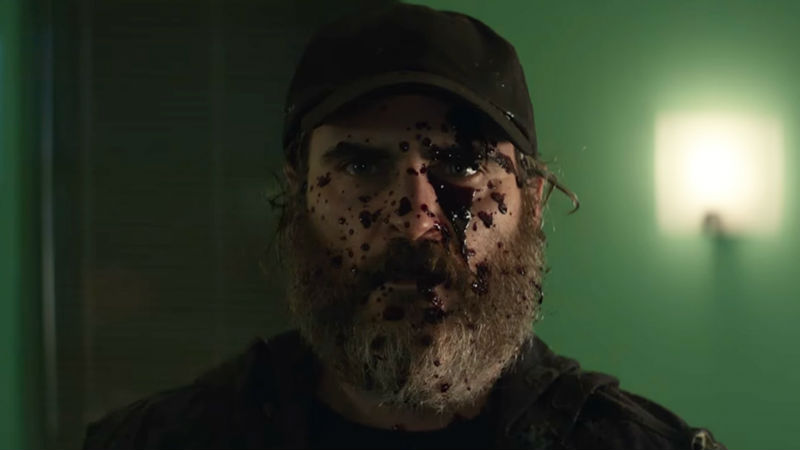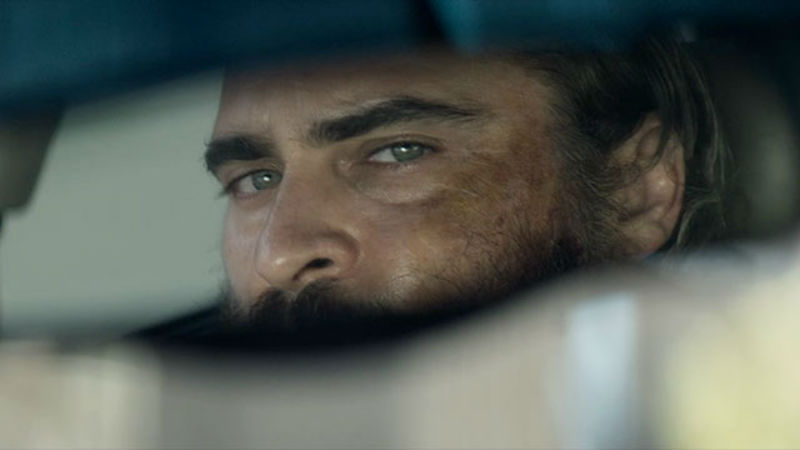




Dazzling. Kaleidoscopic. Violent. Psycho. Taxi Driver. Scottish director Lynne Ramsay’s latest film is at once a rare piece of virtuoso cinema playing with the possibilities of the form and a dark journey into a Hellish American underbelly. The images are the cinematograph’s answer to great paintings courtesy of production designer Tim Grimes and director of photography Thomas Townend: the music is an unforgettable, sometimes pounding score by Jonny Greenwood interspersed with classic songs like If I Knew You Were Coming I’d’ve Baked You A Cake, in this context all the more unsettling for their homeliness.
Joaquin Phoenix’s performance is completely out there. One could say he dominates the movie, but actually Ramsay’s images and sounds dominate it just as much as Phoenix does. He has a much bigger role here than he does playing Jesus in Mary Magdalene, out next week. It seems almost disingenuous that of the two roles, You Were Never Really Here is the one that should tower above the medium. Maybe that’s the problem with portraying good and evil: it’s much easier to make evil stand out. Not that Phoenix’s character here is entirely bad: his antihero possesses a certain moral ambiguity.

Joe (Phoenix) is a mercenary employed by rich fathers of disappeared teenage girls to track them down and rescue them from captivity – meaning enforced sex work in houses used by paedophile rings. Joe’s modus operandi is to work out how many people including guards or security are inside, then take a hammer and bludgeon them to death as he encounters them one by one in order to safely remove his client’s daughter and return her to her father.
But this is no linear plot. The narrative is fractured so that, for example, events seen at the start turn up again later on. Were you watching a flashback? A flashforward? These games are constantly played with the audience, so much so that the piece may actually play differently to you if you go back and watch it again. There are moments cutting from the adult Joe to glimpses of him experiencing trauma as a child, for example breathing with a polythene bag over his head. Who is Joe? What happened to him in the past to make him the way he is now? We are given hints but told nothing specific and expected to draw our own conclusions. A multiplicity of interpretations, perhaps?
He constantly looks in on the home of his ageing mother (Judith Roberts) to check she’s okay. When he first visits, she’s been watching a TV rerun of Psycho (Alfred Hitchcock, 1960) and it’s scared her. As in, she’s enjoyed watching a really scary movie. She takes a shower. She’s as independent and strong-willed as he is – and Joe is torn between being frustrated by the fact and being a devoted son. He mimics knife-slashing outside her bathroom door while she showers inside.

The other major female character is Senator’s young daughter Nina (Ekaterina Samsonov), drugged to her eyeballs when Joe rescues her from a paedophiles’ brothel. A young girl with no idea of what’s going on or being done to her. Very different from the seemingly savvy underage child prostitute played by Jodie Foster in Taxi Driver (Martin Scorsese, 1976) and apparently at the opposite end of things from Joe’s own mother – young, healthy and adrift rather than old, frail and anchored. And yet, these archetypes are undermined in the course of the film: mother has become the victim and Nina has been rescued.
Finally, who is Joe? In the closing minutes, he performs an extreme act of violent self-harm right before our eyes. Or perhaps not. Perhaps it’s in his imagination. Or perhaps it isn’t and the narrative’s happy ending is in his imagination.
Cut to somewhere in the middle of the film. Joe has delivered hammer blows to the head of two suited thugs. One of them, who has admitted that he wasn’t the murderer on this occasion, lies dying on the floor. Joe lies down beside him and allows the dying man to hold his hand. A moment of tenderness in the aftermath of violence.
The film constantly shifts the audience’s allegiances like this. Sometimes we warm to Joe. At other times, he’s our worst nightmare. He doesn’t say a lot. The strong script is generally sparse on dialogue, preferring to provide the wherewithal for the film to weave its magic/wreak its havoc in sounds, images, performances, editing and music. As such, it’s a highly visceral experience almost unimaginable in a medium other than cinema. It’s also indubitably dirty in its subject matter, in its manipulation of the cinematic medium and in its dealings with the audience. Even down to its enigmatic title, taken from the book from which it was adapted. If you were never really here, then that begs the question, where were you really? Should you have been here or should you have been somewhere else? Or did you really imagine the whole thing?
You Were Never Really Here was out in UK cinemas on Friday, March 9th. It’s available for digital streaming on Monday, July 2nd.





















